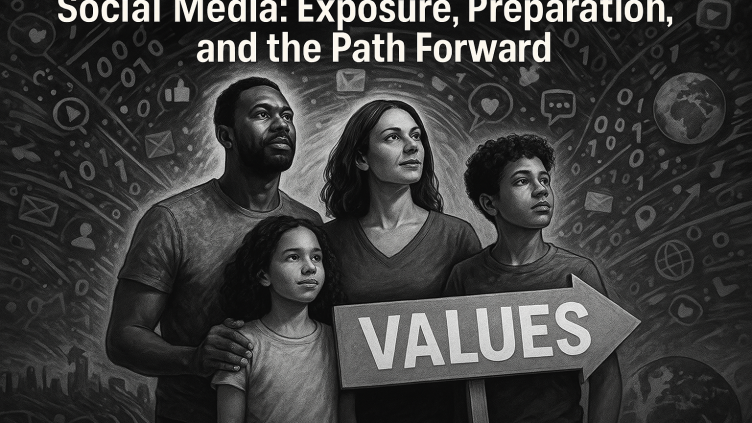The Real Problem Isn’t Social Media: It’s Our Precious Children’s Uncontrolled Access (Part II): Exposure, Preparation, and the Path Forward)

Intro
Last week, we examined how our failure of foresight and example helped shape today’s digital crisis.
In this second and concluding part of #HomilyFromThePew, we turn from reaction to reflection from fear to formation. We ask not how to escape the digital world, but how to prepare our children to master it with wisdom, courage, and heart.
Exposure vs. Undue Exposure
Exposure is part of growth. Children are meant to encounter the world — gradually, under guidance.
The problem is not that they see the world; it is that they now see it alone.
Some children have used social media to build apps, launch movements, and find purpose.
Others have fallen into comparison, addiction, exploitation, and despair. The difference is not the platform, it is the preparation.
If exposure is inevitable, preparation must be intentional. Every family, school, and nation must ask:
Will we prepare our children to live wisely in a digital world, or will we pretend we can wall them off from it?
Because in this Fourth Industrial Revolution, banning access is not the same as building resilience.
When Parenting Became a Competition
Parenting today is an endurance test. Our rivals are no longer other parents — they are platforms.
The competition is for time, trust, and attention.
We once said, “children are listening.” Today, someone else is talking to them, twenty-four hours a day, in tones more persuasive than ours. Chatbots now play counselor. Artificial intelligence has become their comforter when they feel unseen.
But that is not the machine’s fault. It is evidence of a human vacuum.
Years ago, I wrote an article titled“Vacancy: Parents Apply Within.” I argued that children walk through life with invisible placards reading: Vacancy for care. Vacancy for guidance. Vacancy for protection.
Back then, human predators filled those vacancies. Today, algorithms have taken their place.
Nature does not allow emptiness. Where guidance is absent, gadgets will fill the gap. Where parents are silent, platforms will speak. Our children’s first screen should be our faces, not their phones.
If that connection breaks, another connection, colder and algorithmic, will take its place.
The Missed Conversation
We have spent too much time discussing what social media is doing to our children and too little time asking what we are doing with them.
Values must precede devices. Conversation must come before correction. Connection must come before control.
We must teach our children that not every question deserves a digital answer. We must remind them that life’s hardest questions require humans, not machines. We must model what we want them to mirror, curiosity without compromise, confidence without cruelty, freedom with boundaries.
Reaction or Reflection?
Let’s be honest: this panic-driven banning culture is a reaction, not a resolution. We are making decisions under pressure because we ignored prevention.
We don’t ban cars because of accidents, we design seatbelts, train drivers, and enforce speed limits.
We don’t ban guns entirely; we talk about control.
Yet, when it comes to social media, we swing between denial and prohibition.
We demonize what we should be disciplining.
We ban what we should be balancing.
When we are reactive, we lose the moral clarity that responsibility requires.
The Opportunity Conversation
The internet is not an enemy. It is a mirror , reflecting both the best and the worst of human nature.
Alongside predators are pioneers. Alongside bullies are builders.
Yet, almost every conversation about children and social media begins with fear: danger, addiction, abuse, corruption.
But no conversation that begins with fear ever produces wisdom.
When teaching children about cars, we begin with purpose, mobility, connection, progress not accidents.
The same must hold true for social media. The conversation must begin not with danger, but with dignity and potential.
Opportunities and risks are twins. The higher the opportunity, the higher the risk. The goal is not avoidance but awareness.
You cannot frighten a child into wisdom, you can only form a child into it.
Children awakened to purpose will pursue it with passion. They will see that the digital world is not their enemy it is their environment.
Our task is to guide their curiosity toward creation, not destruction.
The greatest companies in the world are digital. The most influential creators and educators thrive online.
MrBeast began as a nine-year-old with a camera and a dream; today, he feeds millions. The difference was not exposure, it was direction.
When children see what is possible, they learn that social media can be a tool for influence, innovation, and inspiration, not addiction, imitation, or isolation.
If we begin with fear, we will raise fugitives of the digital age. If we begin with opportunity, we will raise architects of it.
The Spiritual Truth
The internet does not corrupt by itself; it amplifies what already exists in the heart. If the foundation is weak, technology magnifies the cracks. If the foundation is strong, it multiplies the impact.
“Guard your heart with all diligence, for out of it are the issues of life.” (Proverbs 4:23) Our children’s hearts are shaped not only by what they are told, but by what they scroll. Let us ensure what they scroll aligns with what we sow.
A Call to Parents, Teachers, and Society
We must redefine parenting as a daily act of digital leadership. We must empower teachers, the TeacherFIRE™ way to minister not only to the head of the child, where knowledge is stored, but to the heart, where values are formed. We must insist that schools and churches stop outsourcing digital morality to the internet and start embedding safeguarding into every conversation.
When children see consistency between what we say and how we live, both online and offline, we will not have to compete with influencers, we will become them.
Building the Inner Guardrails
The true guardrails are not software filters or parental locks. They are values. Teach a child integrity, and he will self-censor when no one watches. Teach a child discipline, and she will pause before she posts. Teach a child love, and he will seek to build, not destroy.
When we raise children with these inner boundaries, we no longer fear what’s online — because their compass works both offline and online.
Final Reflections
The social media crisis is not a war between good parents and bad platforms. It is a call for wisdom, wisdom that balances access with accountability, freedom with formation.
Let us not demonize technology while neglecting theology, the truth that humans, not machines, carry moral responsibility.
If we plant wisdom, our children will navigate the digital world with grace. If we plant fear, they will stumble through it in rebellion.
Social media is not raising our children, our silence is. Let us reclaim our role before algorithms finish the job. Let us raise children who bring values to their devices, children who can live in the world without being consumed by it.
Because the real problem isn’t social media. It’s our children’s uncontrolled access and our unexamined absence.
Do have an INSPIRED week with the family





